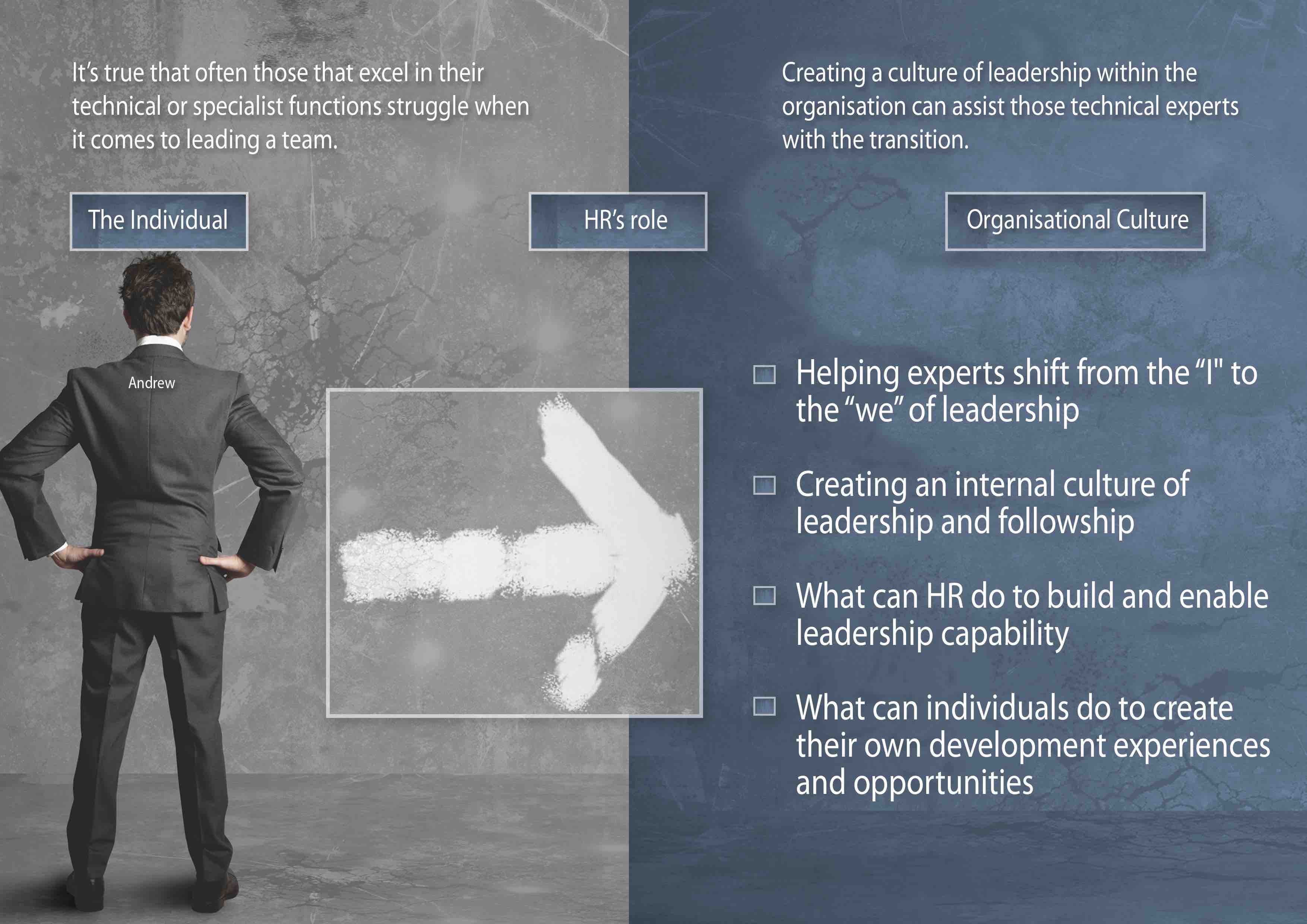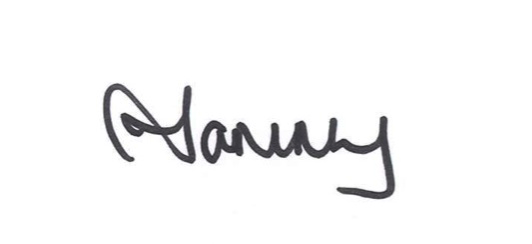 Moving from Technical Expert to Leader
Moving from Technical Expert to Leader
In my series on how to move from a technical expert to leader, I suggest that there are three components which as necessary for a successful transition:
- The individual and the manner in which they manage the transition
- HR and its people practises and programmes
- The culture of the organisation
In part one of this series we met “Andrew” and looked at what the individual can do to move from being a technical expert to a leader. In part two, we looked at HR’s role in assisting the individual.
Today’s post is the final piece of the jigsaw – what role does the organisation and the culture have on the transition from technical expert to leader?
The role of culture on helping the individual move from technical expert to leader
It’s really difficult even for the best HR programmes to flourish or with the best individual in the world to thrive if the organisation’s culture is rubbish.
Where there is an environment of blaming and lack of responsibility.
Where people look to pass the buck rather than take accountability.
Where there’s triangular discussions rather than direct and honest feedback.
Where people operate in a mushroom like environment – in the dark.. not really knowing what is going on.
Where power is bandied around for evil rather than influence being used for good.
Even the best, most enthusiastic new leader is going to struggle in this sort of environment.
Let’s be clear that it is not impossible to thrive in an environment that is less than optimal in terms of culture. BUT, and this is a big BUT; it’s so so much harder to have to swim against the grain of the organisation, its culture and all that it encourages and supports.
The “ideal culture”
Culture is typically defined as the ways of working around here. It is the vibe that you get when you walk into an organisation. It’s the million little things that make up the organisation.
For technical experts to transition to leaders, there needs to be some aspects of culture that support this transition.
Ideally, the organisational culture should support the concept of leadership, and create an environment where leadership and followship occur naturally.
For the technical expert to have the best chance of succeeding, an ideal culture would look a bit like this:
- Firstly – an environment that supports great leadership rather than one that thinks leadership is a whole lot of mumbo jumbo and that people should just do what they are told to do.
- Secondly – an environment which supports learning and development and failure. It is hard moving from being a high flying high performing technical expert to suddenly leading a team. There will be missteps and mistakes along the way. The first sign of a healthy culture that promotes the development of new leaders is that such mis-steps and mis-takes are not punished but rather viewed as necessary part of learning. The organisational system is set up to encourage taking risks/trying new approaches rather than penalising failures. This sounds easy but organisations often struggle with the reality of it. But remember you’re asking the technical expert to display behaviours that are different and new to the ones that have got them here so far – without doubt there will be some mis-steps along the way. It’s how this is dealt with that it is the key to the healthy organisation.
You have probably all heard the story of a 1940’s IBM employee who made a mistake that cost the company about one million dollars. Knowing that he was about to be fired, the employee typed up his letter of resignation, and handed it to the CEO Watson. Watson responded: “Fire you? I’ve just invested one million dollars in your education, and you think I’m going to fire you?”
- A healthy culture communicates – regularly, formally, informally.. People know what is going on. The top leadership tell their teams who pass it on. Or they tell their teams if they can’t talk about it. Healthy cultures are clear about what is going on and how this links to the organisational strategy and direction.
- They are clear about the responsibility and accountability and decision making authority that each leader has (and this is detailed in the role charter).
- Nothing kills the passion for new leaders who moved from the high performing specialist to leader more than discovering that they are meat in the sandwich – the dumping ground from above and below. Healthy cultures don’t do this because everyone is clear about what is happening and who does what. There is a culture of courageous conversations where people are clear about giving honest feedback that supports, enables and builds rather than destroys trust. And where the more senior of leaders take the appropriate responsibility for mistakes rather than blaming or looking to pass the buck.
- Healthy cultures have a “freedom within the framework” approach to policies and procedures. There are no unnecessary rules, procedures, policies or practices. Healthy cultures encourage new leaders to make decisions within the framework and within their decision making authority without having to check.
- Healthy cultures have a remuneration structure that supports the move from technical specialist to leader. There are so many examples of companies I have worked in where the new leader earns less than the people reporting to him or her. Usually this is a function of shift, overtime and other allowances but it is hard to maintain motivation when you are the person holding all the accountability but get paid less. We know that money is usually not a motivator for people –but it is a dissatisfier if the money is perceived to be not enough and there are other things wrong. Often companies can’t address the base pay issues given long standing remuneration frameworks and enterprise agreements, but being aware of it, and building it into the reward and recognition scheme can go a long way.
What happens if the culture is rubbish?
A quick note on what happens if the culture is rubbish. Does that mean the new leader gives up?
Often the environment is untenable and makes it very difficult for a new leader, but there is learning even in this.
What does the culture and other leadership teach the new leader about what they don’t want to do? Even in this environment, new leaders can make a decision to operate in a way that is different from the cultural norm – it’s difficult yes, but not impossible.
A healthy leadership culture
So, the culture of the organisation is the third critical element of the puzzle to support the development of the high performing technical expert to new leader. Here’s a checklist again of what it might look like:
- A culture that supports and believes in great leadership (and understands what leadership is vs management) and supporting new leaders in learning to be the best that they can be.
- A culture that supports failures, mis-takes and mis-steps (and genuinely understands that failure is part and parcel of learning and growth).
- A culture that communicates – often, clearly and transparently (at all levels).
- A culture where accountability and decision making is clear (and people own their accountability – no teflon here!)
- A culture that is clear about who does what and how this links to the broader organisational plan (remember back to the role charters we talked about last time).
- A culture where leaders are given “Freedom within the framework” (they’re told broadly what needs to happen/why – but the how is largely determined by them within broad guidelines. That is, the opposite of micromanagement).
- Remuneration / recognition and reward that is appropriate and actually recognises and rewards!
So, that’s it – the three components that are necessary to move the technical expert to a leader. What do you think? What else would you add? Anything that is absolutely critical?
Until next week, happy leading.


